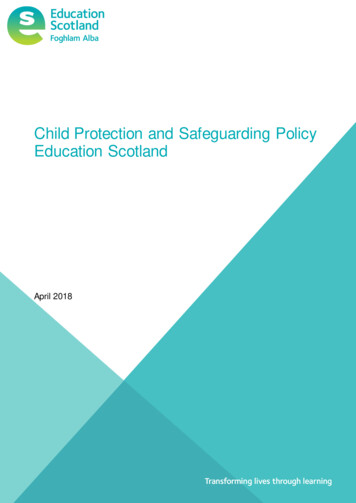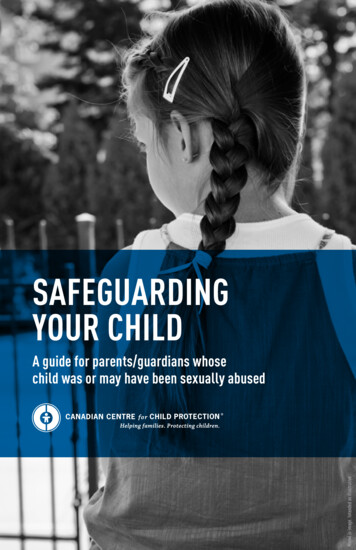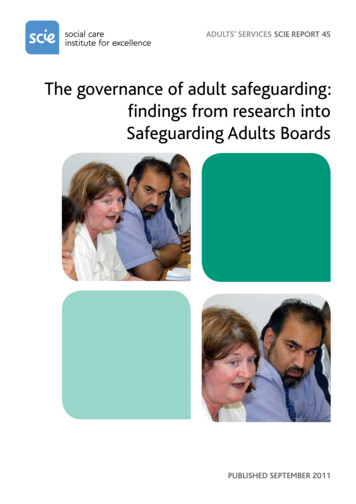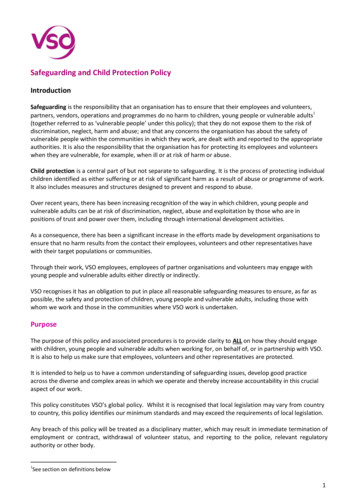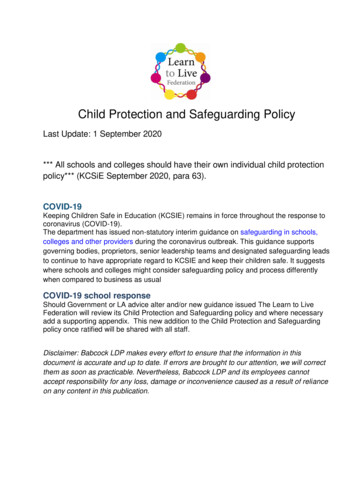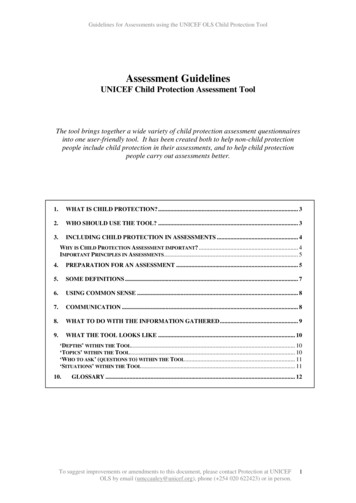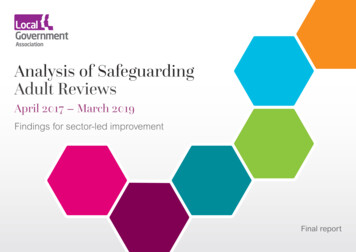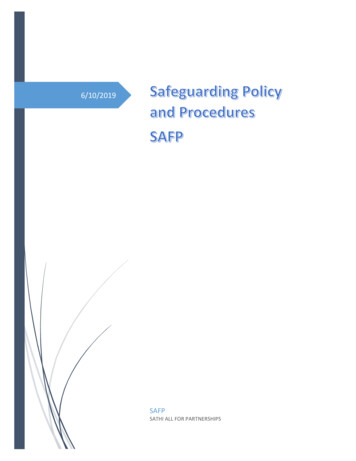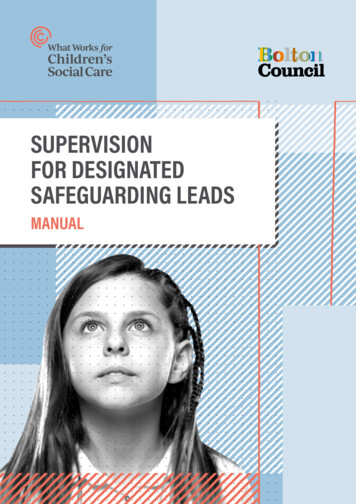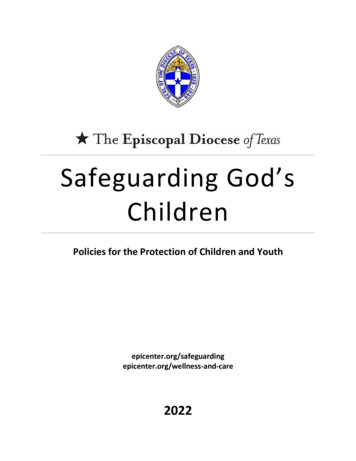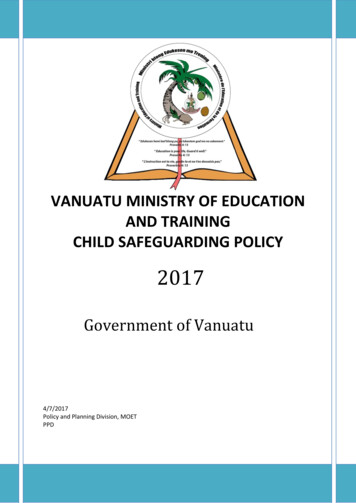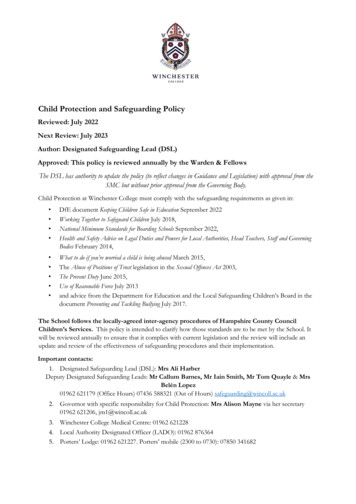
Transcription
Child Protection and Safeguarding PolicyReviewed: July 2022Next Review: July 2023Author: Designated Safeguarding Lead (DSL)Approved: This policy is reviewed annually by the Warden & FellowsThe DSL has authority to update the policy (to reflect changes in Guidance and Legislation) with approval from theSMC but without prior approval from the Governing Body.Child Protection at Winchester College must comply with the safeguarding requirements as given in: DfE document Keeping Children Safe in Education September 2022Working Together to Safeguard Children July 2018,National Minimum Standards for Boarding Schools September 2022,Health and Safety Advice on Legal Duties and Powers for Local Authorities, Head Teachers, Staff and GoverningBodies February 2014, What to do if you’re worried a child is being abused March 2015,The Abuse of Positions of Trust legislation in the Sexual Offences Act 2003,The Prevent Duty June 2015,Use of Reasonable Force July 2013and advice from the Department for Education and the Local Safeguarding Children’s Board in thedocument Preventing and Tackling Bullying July 2017.The School follows the locally-agreed inter-agency procedures of Hampshire County CouncilChildren’s Services. This policy is intended to clarify how those standards are to be met by the School. Itwill be reviewed annually to ensure that it complies with current legislation and the review will include anupdate and review of the effectiveness of safeguarding procedures and their implementation.Important contacts:1. Designated Safeguarding Lead (DSL): Mrs Ali HarberDeputy Designated Safeguarding Leads: Mr Callum Barnes, Mr Iain Smith, Mr Tom Quayle & MrsBelén Lopez01962 621179 (Office Hours) 07436 588321 (Out of Hours) safeguarding@wincoll.ac.uk2.Governor with specific responsibility for Child Protection: Mrs Alison Mayne via her secretary01962 621206, jm1@wincoll.ac.ukWinchester College Medical Centre: 01962 6212284. Local Authority Designated Officer (LADO): 01962 8763645. Porters’ Lodge: 01962 621227. Porters’ mobile (2300 to 0730): 07850 3416823.
IndexThis policy should be read in conjunction with the School policies in the Appendix as listed below.1.0 Overview2.0 Concerns about a Child3.0 Concerns about an Employee4.0 After a report is made5.0 Managing allegations against other pupils (Child on child abuse)6.0 ConfidentialityAPPENDIX 1: Code of Professional Conduct for all StaffAPPENDIX 1a: Use of Reasonable Force PolicyAPPENDIX 2: Role Description for People with Specific Responsibility for Child ProtectionAPPENDIX 3: Important Phone Numbers (for Display on Boarding House Notice Boards)APPENDIX 4: Counter Bullying PolicyAPPENDIX 4a: Online Safety and Counter Cyber Bullying PolicyAPPENDIX 4b: Youth Produced Sexual Imagery PolicyAPPENDIX 4c: Gender Identity PolicyAPPENDIX 5: Missing Pupil PolicyAPPENDIX 6: School Recruitment and Selection ProcedureAPPENDIX 7: Use of Contractors and Supply Staff PolicyAPPENDIX 8: Recruitment of Ex-Offenders PolicyAPPENDIX 9: Disciplinary Procedure for All StaffAPPENDIX 10: Whistleblowing PolicyAPPENDIX 11: Safeguarding and Child Protection TrainingAPPENDIX 12: Risk Assessment for Visiting SpeakersAPPENDIX 13: HSCP Threshold ChartsAPPENDIX 14: Hyperlink to Keeping Children Safe in Education 2022 including Part OneKey:BSA: Boarding Schools AssociationDBS: Disclosure and Barring ServiceDfE: Department for EducationDSL: Designated Safeguarding LeadISI: Independent Schools InspectorateKCSIE: Keeping Children Safe in EducationLADO: Local Authority Designated OfficerHSCP: Hampshire Safeguarding Children PartnershipMASH: Multi Agency Safeguarding HubTRA: Teaching Regulation AgencyPSHEE: Personal Social Health and Economic EducationChild Protection and Safeguarding Policy
1.0 OverviewAdults looking after children or young people must be aware of the risk of abuse by adults or otheryoung people. Child abuse can occur in all walks of life and Winchester College should not be consideredin some way immune. Pupils have the right to be safeguarded from harm and exploitation regardless ofrace, religion, ethnicity, age, gender, sexual orientation or disability.See Appendix 1 for the Code of Professional Conduct for Staff Winchester College is dedicated to safeguarding and promoting the welfare of its boarding and daypupils, regardless of age, ability, race, culture, religion, sexual orientation, gender or class. It is the duty of all members of staff, teaching and non-teaching, to play an active role in ensuringthe safety and promoting the welfare of the children in the School’s care as children in residentialsettings can be particularly vulnerable. Staff should exercise professional curiosity if they haveconcerns about a child and they should speak to the Designated Safeguarding Lead, or a DeputyDSL, about those concerns. It is the duty of the IT staff to ensure that internet access and electronic communication is as safeas possible. All staff are expected to be aware of and follow the child protection and safeguarding procedures.In particular they need to read Keeping Children Safe in Education Part 1 and Annex B, (or AnnexA only if not working directly with children) (Appendix 14) and this policy, as it outlines their dutyto report concerns, the guidance for identifying child abuse, what to do if a child makes anallegation of child abuse and issues about confidentiality. All staff are issued with guidelines and undergo training as outlined in Appendix 11. Sixth Bookpupils also receive guidelines on child protection and safeguarding procedures as part of theirhouse prefect induction. We provide a structured Personal, Social, Health and Economic Education (PSHEE) programmewithin the curriculum Tutorial Time which aims at developing personal and inter-personal skillsand deals specifically with safeguarding issues, Relationships and Sex Education (RSE), e-safety andresilience to risks of radicalisation. This is overseen by the Head of PSHEE, Mr Tom Quayle. There are protocols to ensure that all visitors are appropriately checked and supervised.Arrangements are specified in the Site Security policy. There are specific requirements for VisitingSpeakers to ensure that the content of their presentation is appropriate for pupils. See Appendix 12for details. Public tours are undertaken but are always accompanied and take place at confirmed times. School employees do not investigate serious allegations of child abuse themselves. All allegationswill be reported to Children and Young People’s Services (Hampshire Children’s Services)immediately. When a serious allegation is made against an employee, the School will report it to theLocal Authority Designated Officer (LADO). The LADO provides advice and presides over theinvestigation of any allegation or suspicion of abuse directed against any school employee. Theywill advise whether or not it is necessary to inform the Secretary of State for Education at theDepartment for Education, even if the School no longer employs the person in question. Safeguarding and promoting the welfare of children is the responsibility of all employeesand anyone can make a referral to the Children and Young People’s Service (Hampshire Children’sServices), as outlined in Section 2.4. Concerns regarding Quiristers should be referred to Mr Thomas Rainer, DSL of The Pilgrims’School, on 01962 854189.
Under the Governing Body’s authority, the following persons have specific responsibility for ChildProtection matters at the School:Dr T R Hands (Headmaster)Mrs A Harber (Deputy Head Pastoral & Designated Safeguarding Lead)Mr I Smith (Second Master & Deputy Designated Safeguarding Lead)Mr C P Barnes (Deputy Designated Safeguarding Lead)Mrs M B Lopez (Deputy Designated Safeguarding Lead)Mr T Quayle (Deputy Designated Safeguarding Lead)Mrs A Mayne (Governing Body)See Appendix 2 for a description of their roles and Appendix 3 for their contact details.2.0 Concerns about a Child2.1 DefinitionsSafeguarding is everyone’s responsibility. It involves protecting children from maltreatment, preventingimpairment of children’s health and development, ensuring that children grow up in circumstancesconsistent with the provision of safe and effective care and taking action to enable all children to have thebest outcomes. Children includes everyone under the age of 18.Somebody may abuse or neglect a child by inflicting harm, or by failing to act to prevent harm. A child maybe abused by an adult or adults or another child or children known to them, or more rarely, by others (e.g.online). Children can be at risk of harm inside and outside of School, inside and outside of home as well asonline. Child Protection involves identifying and managing specific pupils who are at risk of significantharm due to: Abuse: a form of maltreatment of a child. Somebody may abuse or neglect a child by inflictingharm or by failing to act to prevent harm. Harm can include ill treatment that is not physical as wellas the impact of witnessing ill treatment of others. This can be particularly relevant, for example, inrelation to the impact on children of all forms of domestic abuse. Technology can be a significantcontributor to abuse. Children can be abused online including by other children as well as byadults. This can take the form of abusive, harassing, and misogynistic/misandrist messages, thenon-consensual sharing of indecent images, especially around chat groups, and the sharing ofabusive images and pornography, to those who do not want to receive such content. Physical Abuse: deliberately hurting a child causing injuries such as bruises, broken bones, burnsor cuts. It isn’t accidental - children who are physically abused suffer violence such as being hit,kicked, poisoned, burned, slapped or having objects thrown at them. Physical harm may also becaused when an adult fabricates the symptoms of, or deliberately induces, illness in a child. Sexual Abuse: children who are forced or persuaded to take part in sexual activities. This doesn'thave to be physical contact, and it can happen online. Emotional Abuse: ongoing emotional maltreatment or emotional neglect of a child. This issometimes called psychological abuse and can seriously damage a child’s emotional health anddevelopment. Emotional abuse can involve deliberately trying to scare or humiliate a child orisolating or ignoring them. Emotional abuse can also take place online. Neglect: Neglect is the ongoing failure to meet a child's basic needs. A child may be left hungry ordirty, without adequate clothing, shelter, supervision, medical or health care. A child may be put indanger or not protected from physical or emotional harm. They may not get the love, care andattention they need from their parents.Child Protection and Safeguarding Policy
Child Sexual Exploitation (CSE) & Child Criminal Exploitation (CCE): are forms of childabuse that occur where an individual or group takes advantage of an imbalance of power to coerce,manipulate or deceive a child or young person under the age of 18 into sexual or criminal activity(a) in exchange for something the victim needs or wants, and/or (b) for the financial advantage orincreased status of the perpetrator(s) or facilitator (e.g. transporting drugs/money). The victim mayhave been sexually exploited even if the sexual activity appears consensual. Child sexualexploitation does not always involve physical contact; it can also occur through the use oftechnology (e.g.: forcing children to look at sexual images or watch sexual activities). Exposure to Extremism: Under section 26 of the Counter-Terrorism and Security Act 2015Winchester College has “due regard to the need to prevent people from being drawn intoterrorism”. This duty is known as the Prevent Duty. The School builds pupils’ resilience toradicalisation by promoting fundamental British values and enabling them to challenge extremistviews. It is important to emphasise that the Prevent duty is not intended to stop pupils debatingcontroversial issues. On the contrary, the School is committed to providing a safe space in whichpupils can debate controversial issues related to religion, culture, history, politics and civicresponsibility. This discussion will allow them to understand the risks associated with terrorism anddevelop the knowledge and skills to be able to challenge extremist arguments. Exposure to Manipulation, Indoctrination and ExploitationManipulation, indoctrination and exploitation (whether verbal, psychological or physical) refer tothe strategies whereby an individual (child or adult) may be encouraged or coerced into unsafebehaviours or allegiances. Winchester College builds pupils’ resilience to manipulation,indoctrination and exploitation by promoting fundamental British values and making clear inlessons and in policies what is acceptable and not acceptable behaviour. The School’s Code, Rulesand Principles of Boarding require all individuals (regardless of race, religion, ethnicity, age, gender,sexual orientation or disability) are treated equally and with respect, free from abuse, teasing,harassment, bullying, discriminatory language or any other kind of anti-social behaviour.Discussions around these matters enable pupils to understand the risks associated with potentialmanipulation, indoctrination and exploitation and allow them to resist such strategies.’ Female Genital Mutilation: Female Genital Mutilation (FGM) comprises all proceduresinvolving partial or total removal of the external female genitalia or other injury to the femalegenital organs. It is illegal in the UK and a form of child abuse with long-lasting harmfulconsequences. It is important that you are aware that reporting of incidents of FGM aremandatory. Other: domestic abuse (which may be psychological, physical, sexual, financial or emotional andincludes witnessing the ill-treatment of others), Honour based abuse (such as FGM), bullying(including cyber bullying), drugs, induced illness, youth violence, faith abuse, youth producedsexual imagery (sexting), serious violence/gangs (including that linked to county lines),radicalisation, children missing education (Appendix 5), teenage relationship abuse (which may alsoinclude domestic abuse). For further information, visit the NSPCC website.Abuse, neglect and safeguarding issues are rarely standalone events that can be covered by onedefinition or label. In most cases, multiple issues will overlap with one another.Details about specific forms of abuse can be found in Keeping Children Safe in Education, Annex B.Safeguarding incidents and/or behaviours can be associated with factors outside the school and/or canoccur between children outside the school or college. All staff, but especially the Designated SafeguardingLead (or Deputy) should consider whether children are at risk of abuse or exploitation in situations outside
their families. Extra-familial harms take a variety of different forms and children can be vulnerable tomultiple harms including (but not limited to) sexual exploitation, criminal exploitation, and serious youthviolence. This is known as contextual safeguarding. Assessments of children should consider whether widerenvironmental factors are present in a child’s life that are a threat to their safety and/or welfare.2.2 Indicators of abuse or neglectThe following is advice from the document What to do if you’re worried a child is being abused, 2015. Some of thefollowing signs might be indicators of abuse or neglect: Pupils whose behaviour changes – they may become aggressive, challenging, disruptive, withdrawnor clingy, or they might have difficulty sleeping; Pupils with consistently poor hygiene; Pupils who make strong efforts to avoid specific family members or friends, without an obviousreason; Pupils who don’t want to change clothes in front of others or participate in physical activities; Pupils who are having problems at school, for example, a sudden lack of concentration andlearning or they appear to be tired and hungry; Pupils who talk about being left home alone, with inappropriate carers or with strangers; Pupils who do not reach developmental milestones; Pupils who are reluctant to go home during school breaks; Parents who are dismissive and non-responsive to practitioners’ concerns; Parents who collect their children from school when drunk, or under the influence of drugs; Pupils who drink alcohol regularly from an early age; Pupils who are concerned for younger siblings without explaining why; Pupils who talk about running away; and Pupils who shy away from being touched or flinch at sudden movements.2.23 Indicators of greater risk of harm Children who need a social workerChildren missing from educationWhere a parent/carer has expressed their intention to remove a child from school with a view toeducating them at homeChildren requiring mental health supportLooked after and previously looked after childrenChildren with special educational needs and disabilities or health issuesChildren who are LGBT2.3 Receiving a disclosureIf you suspect abuse, a young person confides in you, or a complaint is made to you about any adult orabout yourself, it is your duty to report the concern to the Designated Safeguarding Lead. If a young persontells you about abuse by someone else:1.Always stop and listen straightaway. Ask open-ended, rather than leading, questions such as ‘Whathappened?’ and ‘Who was involved?’Child Protection and Safeguarding Policy
2.Be patient as it may take some time for a young person to explain a situation to you. Don’t givethe impression that you don’t believe them or that they are creating a problem by reporting abuse.A young person is not always ready or able to talk about their experiences and/or they may notalways recognise that they are being abused.3.Offer reassurance that you will take what they have told you seriously.4.Write brief notes outlining the conversation either during or immediately after the disclosure. It isimportant that you try to record the pupil’s words objectively and without judgement. Sign anddate your notes.5.Do not guarantee confidentiality. Explain that you will have to report the matter to DesignatedSafeguarding Lead so that they can offer help and guidance.6.Report the matter to the DSL and give them a copy of your signed notes.7.The DSL will inform you if you have any further obligations.Child abuse to be reported includes abuse of a pupil by an employee or other adult, abuse at home which apupil reports to staff, abuse by a stranger outside the School, and abuse of one pupil by another pupil (childon child abuse) including online.In the case of abuse by a pupil, or group of pupils, the key issue is identifying the problem as abuse (ratherthan an isolated instance of bullying or ‘adolescent experimentation’ or ‘banter’). If an incident isconsidered abuse rather than bullying it is because: of the frequency, nature and severity of the incident(s); of the ages and relative ages of the children involved; the victim was coerced by physical force/fear or by a pupil or group of pupils significantly olderthan them, or having power or authority over them; the incident involved a potentially criminal act, and whether if the same incident (or injury) hadoccurred to a member of staff or other adult, it would have been regarded as assault or otherwiseactionable; the bullying involves a specific serious incident, such as a serious physical or sexual assault or itmight persist despite attempts to intervene.Abuse will be reported to the Designated Safeguarding Lead who will contact Hampshire Children’sServices (Tel: 0300 555 1384) for guidance.2.3 To whom do you report?Any employee who knows of, is told of, or strongly suspects, that a pupil is at significant risk of harm eitherin the School, at home or outside the School, they must report the information immediately to theDesignated Safeguarding Lead (Mrs Ali Harber, safeguarding@wincoll.ac.uk, Tel: 07436 588321/01962621179) who will then refer the matter to the appropriate person as illustrated below. In the absence of theDesignated Safeguarding Lead, the immediate report should be made to a Deputy DesignatedSafeguarding Lead.When concerned about the welfare of a child, employees should always act in the best interests of thechild. Notwithstanding the procedures below, anyone may make a referral to external agencies if necessary.If anyone other than the DSL makes a referral, they should inform the DSL as soon as possible.
Allegation againstanother pupil, a familymember or a member ofthe publicAllegation/Concernagainst any member ofstaff or a volunteerAllegation against theHeadmaster or amember of thegoverning bodySerious and/orimmediate harm orFemale GenitalMutilation (FGM)Emergency ServicesHeadmasterGovernor with specificresponsibility for CP,Mrs Alison Mayne viaher secretary: 01962621206.Report to the DSLIn their absence, reportto Deputy DSL.07436 58832101962 621105Accused not to beinformed prior.Elevated concernsHSCP: HampshireChildren’s ReceptionTeam01329 2253790300 555 1384Channel PolicePractitioner(Counter-Terrorism) 101Low level concernsHousemaster/ParentsPastoral Support GroupMedical CentreWinchester Police999 or 01962 841534(Alert the DSL andHampshireimmediately)Local AuthorityDesignated Officer(LADO)01962 876364Child & Adolescent Health Service (CAMHS)Common Assessment Framework (CAF)Team Around the Child (TAC)Multi Agency Services Hub (MASH)Reports should be made verbally or in person if possible. Please do not rely on leaving a message.See Appendix 3 for other useful contacts.2.4 Early HelpChild Protection and Safeguarding Policy
Depending on the nature of the concern, support may be managed internally with the cooperation of thePastoral Support Group or an early help assessment may be conducted.Early help means providing support as soon as a problem emerges at any point in a child’s life, from thefoundation years through to the teenage years (Working Together to Safeguard Children, 2018). In the firstinstance, staff should discuss early help requirements with the DSL, who will coordinate any referral. Staffmay be required to support other agencies and professionals in an early help assessment.All staff should be alert to the potential need of early help for a pupil who: is disabled and has specific additional needs; has special educational needs; has mental health needsis a young carer; is frequently missing/goes missing from care/school or from home; has returned home to their family from care;is showing signs of being drawn into anti-social or criminal behaviour, including gang involvementand association with organised crime groups or county lines;is misusing drugs or alcohol themselves;is at risk of modern slavery, trafficking or exploitation, or honour-based abuse;is in a family circumstance presenting challenges for the child, such as substance abuse, adultmental health problems and domestic abuse;is showing early signs of abuse and/or neglect.is at risk of being radicalised or exploitedis a privately fostered childis looked after and previously looked after childis persistently absent from educationis engaging in consensual and non-consensual sharing of nude and semi-nude images and/orvideosSchools are often best placed to identify those in need of early help (Appendix 13). An Inter-agencyassessment such as The Common Assessment Framework (CAF) may provide the best way of assessing theneeds of pupils and their families where a range of agencies will be required. Team Around the Family(TAF) and Team Around the Child (TAC) are more specific assessment groups. Assessments shouldidentify what help the child and family require to prevent needs escalating to a point where interventionwould be needed via a statutory assessment under the Children Act 1989Further details can be found in Working Together to Safeguard Children, 2018.2.5 Additional Support (Child in Need and Child Protection Plans)Children may need a social worker due to safeguarding or welfare needs. A child’s experiences of adversityand trauma can leave them vulnerable to further harm, as well as educationally disadvantaged in facingbarriers to attendance, learning, behaviour and mental health. When the school is informed of a socialworker’s involvement, the Designated Safeguarding Lead will hold and use this information so thatdecisions can be made in the best interest of the child’s safety, welfare and educational outcomes.Mental health referrals will be made to the Medical Centre. Medical staff may then refer the pupil to aspecialist for support. The school uses its own Mental Healthcare Pathway procedure, the Pastoral SupportGroups and DfE ‘Mental health and behaviour in schools’ guidance to signpost appropriate support.
3.0 Concerns about an Employee3.1 Concerning behaviourThe expectations of staff and the required standards of behaviour are addressed in Appendix 1: The Code ofProfessional Conduct for all Staff. Staff (including supply staff and contractors) or volunteers who act contraryto the advice offered in this document should be reported to the Designated Safeguarding Lead.Any concerns about a staff member’s behaviour that indicates they may not be suitable to work withchildren should be referred to the Designated Safeguarding Lead. Low level concerns can be shared witheither the Headmaster or the Designated Safeguarding Lead.3.2 When an allegation of abuse is made against an employee or volunteerAny employee or volunteer to whom an allegation of any form of abuse is made should: Limit any questioning to the minimum necessary to seek clarification only, strictly avoiding ‘leading’the pupil or adult who has approached them by making suggestions or asking questions thatintroduce their own ideas about what may have happened. (Do not ask questions like ‘Did s/he dox to you?’ Use instead a minimum number of open-ended questions such as ‘Tell me what hashappened’, but never ask ‘Why?’ something has happened as it may infer the victim is to blame). Stop asking any more questions as soon as the pupil or adult has disclosed that he/she believes thatsomething abusive has happened to them, or to someone else. Tell the informing pupil or adult that the staff member will now make sure that the appropriatepeople are brought in to follow the problem up (these may well include the specialist social worker,and that worker may need to involve the police). Ask the informing pupil or adult what steps he/she would like to be taken to protect him/her nowthat an allegation has been made, and assure him/her that the School will try to follow thosewishes. Refer the matter immediately, with all relevant details to the Headmaster. Make a handwritten record as soon as possible of what you have been told, using the child’s wordsas far as possible, and make a copy of this available to the DSL and Headmaster. If the allegation is against the Headmaster, or a member of the governing body, report directly tothe Fellow with specific responsibility for Child Protection, Mrs Alison Mayne, via her secretary:01962 621206. Do not inform the accused prior to reporting.4.0 After a report is made4.1 Elevated Concerns and the Hampshire Safeguarding Children Partnership (HSCP)The School has a duty to refer allegations about a staff member to the LADO (as per the flowchart in 2.3).If the accused staff member is dismissed, or would have been dismissed had they not resigned then aprohibition order may be appropriate because of unacceptable professional conduct, conduct that maybring the profession into disrepute or a conviction at any time for a relevant offence. In thesecircumstances, the matter is then reported to the Teaching Regulation Agency (TRA). If it is clear that thedeparted accused has harmed, or poses a risk of harm, to a child or vulnerable adult then the School willreport the matter to the Disclosure and Barring Service (DBS). The School also agrees to supplyinformation about individuals to the ISI as and when requested to do so.The School also has a duty to refer information to Children and Young People’s Service (HampshireChildren’s Services) if it is believed or suspected that a child is suffering or is likely to suffer SignificantChild Protection and Safeguarding Policy
Harm. Any such referral must be made as soon as possible when any concern of Significant Harm becomesknown – the greater the level of perceived risk, the more urgent the action should be. The suspicion orallegation may be based on information which comes from different sources. It may relate to a singleincident or an accumulation of lower level concerns. When in doubt, concerns must be shared.Investigations into Child Abuse are always externally managed. Employees do not investigate reports ofphysical or sexual abuse themselves. Alleged victim(s), perpetrator(s), those reporting abuse and othersinvolved will not be interviewed by staff members beyond the point at which it is clear that there is anallegation of abuse. The interviewing of children and adults involved will be carried out by specially trainedstaff only, following procedures in line with government requirements and in the light of therecommendations of past inquiries into the handling of child abuse issues.4.2 ‘Low Level’ Concerns and the Team Around the Child (TAC)If a member of staff has a ‘low level’ concern about another member of staff they must report this. Staffcan choose to report their concern to either the Headmaster or the Designated Safeguarding Lead. TheDesignated Safeguarding Lead will inform the Headteacher. A colleague should not deliberate as towhether a concern is ‘low level’ and thus delay passing the information on. Rather, concerns should bereferred on when they become apparent.‘Low level’ does not mean that a concern is insignificant but rather that it may not meet the harm threshold.A colleague may have a low level concern that is causing a ‘sense of unease’ or a ‘nagging doubt’.
A child may be abused by an adult or adults or another child or children known to them, or more rarely, by others (e.g. online). Children can be at risk of harm inside and outside of School, inside and outside of home as well as online. Child Protection involves identifying and managing specific pupils who are at risk of significant harm due to: ,
